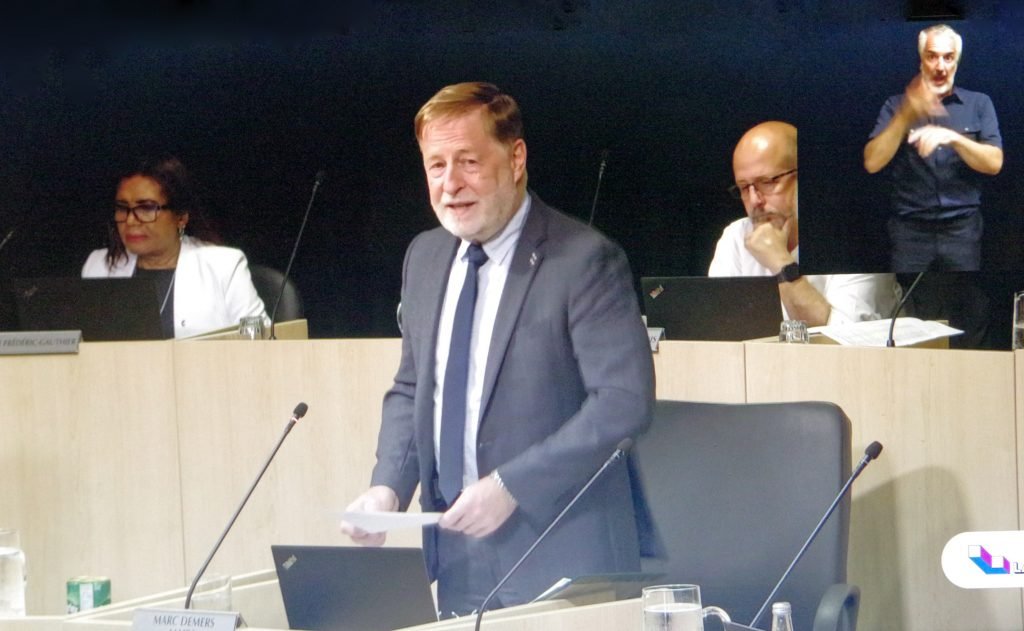New Desjardins contract is 133 per cent higher and most costly ever, says opposition
The City of Laval will be paying Quebec financial services giant Desjardins more than $191 million for employee life insurance coverage over the next five years, in what the official opposition at city hall claims is the largest contract in the municipality’s 56-year history.
The agreement was one of number of expenditures approved by the members of Laval city council during their webcast monthly meeting on Aug. 10.
Cost between city/employees
The Desjardins contract might have gone unnoticed, as do many routine expenditures during council meetings. However, Parti Laval city councillor for Fabre Claude Larochelle singled out the agreement, which amounts to exactly $191,549,842.
While the sum, even when spread out over five years, may seem somewhat staggering – the City of Laval’s total budget for 2021 is $932 million – it’s worth noting that the city itself will be paying only 60 per cent, with the remaining 40 per cent coming from deductions taken from employee salaries.
A 133 per cent increase
However, according to Larochelle, the new contract will raise Laval’s bill for premiums paid on employee life insurance by 133 per cent over the coming five years. “Maybe it’s the best deal, but we didn’t go to public tender, so we don’t know exactly,” he said.
“And it would have shown a little respect to the elected officials to get together a presentation for the biggest contract in the history of the city, and to explain it to the elected officials. Because it’s our residents who are going to be paying for this.
“The tenant on Cartier Blvd. who’s earning $16 an hour and has no group insurance will be paying the $191 million,” added Larochelle. “So, I think we would have deserved to receive some good explanations, which was not the case.”
Position on climate change
With an extremely pessimistic report on global climate change issued the day before the council meeting by the United Nations, Mayor Marc Demers read out a statement at the opening of the meeting in which he outlined the City of Laval’s efforts in recent years to combat environmental warming.
“In the most optimistic scenario, where we would succeed in curtailing greenhouse gas emissions quickly and drastically, the experts are predicting a climate warming by around 1.5 degrees Celsius between now and 2030,” he said, noting that this shortens the window of time since the last assessment by around 10 years.
Action needed, said Demers
“It is clear that among those of us who govern, we are confronted by an urgent need to act and to take even more action than we have until now.”
Among the efforts Demers said the City of Laval has undertaken to do its part to help are a range of subsidies to help pay for electric cars and bicycles, to convert oil-fired furnaces to electric, and a program to recycle old refrigerators containing environmentally-hazardous coolants.
“All these things are steps forward for a greener world,” added the mayor. “We have done a lot, but in light of this latest report, you will understand that I am strongly encouraging those who will follow us on council to do more. We are all responsible to future generations.”
St-Elzéar wetlands threatened
During the public question period, several residents of the Saint-Elzéar Ouest neighbourhood between Curé Labelle and Chomedey boulevards noted that there are number of wetlands in the area, although they maintained the city is doing little to protect them environmentally.
Pointing out that on a recent day in August several residents caught some individuals using equipment in an elaborate attempt to drain one of the wetlands known as the Oasis Bergerac, they asked what sort of commitment city officials would be willing to make to establish better safeguards.
More condos than trees
Vimont city councillor Michel Poissant, who is running for mayor under the banner of his Laval Citoyens party, referred to the Bergerac sector as an “immense heat island” where “there are more cars and condos than there are trees. The wetlands there are important because they are located at the heart of an ensemble of condos.”
While suggesting that Laval appears to still be actively encouraging the development of heat islands by allowing so many condo projects to proceed, he said the city would be better off buying up wooded lands, perhaps with the help of the Quebec environment ministry, and developing more green spaces.
Protection needed, says Boyer
Although the City of Laval owns some of the wetlands in question and others are protected by environmental decrees, Deputy Mayor Stéphane Boyer acknowledged that most are not protected from being drained by private owners.
“We’ll see if there is something we can do to strengthen the protection regulations,” said Boyer, adding that the city began to look at the possibility in recent weeks of buying up private tracts of wetland “because this is in fact a very beautiful area which must be protected.”




